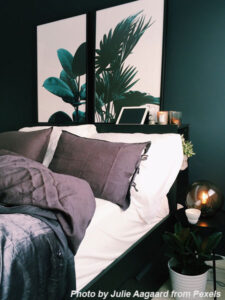My last post covered all the things we should consider during the day to give us the best possible chance of getting restorative sleep at night. Now, it’s time to focus on our five senses and what they need to support a good night’s sleep.
According to sleep expert Dr. Michael Breus, our bedroom environment matters – big time – when it comes to sleep. First and foremost, make sure you have a really good mattress and pillow. If you’ve had yours for quite some time, it may be time for an upgrade. You may also have reached the end of life on the existing equipment if it has been exposed to dust, mites, sweat, and bodily fluids long enough to produce allergens. That kind of spending may not induce a great deal of enthusiasm, but remember: It’s where you spend a third of your life!
TOUCH: Buy high quality products that feel good on your skin. Use natural, breathable fibers – wool, cotton, down – not synthetic. Dr. Breus likes Egyptian cotton sheets, Pima cotton sheets, Modal fiber, and Lyocell at 200-400 thread count that fit the mattress.  A removable pillow cover separate from the pillow case helps with pillow hygiene and potential allergens. Keep things moderately warm to cool; the ideal ambient room temperature for sleep is 65˚-70˚F. Lean toward the lower.
A removable pillow cover separate from the pillow case helps with pillow hygiene and potential allergens. Keep things moderately warm to cool; the ideal ambient room temperature for sleep is 65˚-70˚F. Lean toward the lower.
SIGHT: Ideally, bedrooms should be relatively dark (to boost melatonin) and feature a tranquil color scheme. Forty-watt, blue-light blocking bulbs work quite well. Dimmer switches support those who want the option of a bright light during the daytime. Red or amber night lights can provide illumination for nocturnal bathroom visits. Use a sleep mask if sensitive to light, but wash after each use to prevent eye infections. (I rotate through my collection of 10 inexpensive masks.)
SMELL: While our bodies like freshness, they can make the bedroom fragrance anything but fresh. Open windows at least weekly to circulate some fresh air – and fresh smells – into the boudoir. Regulate humidity, and circulate clean, filtered air when the windows are closed. If you like aromatherapy, try lavender or chamomile, but avoid minty scents.
SOUND: If you cohabitate with a sonorous bedfellow, try using ear plugs rated for a noise level of 32 dB or below. At the other extreme, if the room is too quiet, it may make the ears more sensitive. Try using a sound machine set to a low volume. And don’t settle for an old fashioned alarm clock with its jarring blast of sound. You can awaken to a pleasant sound, a light, or vibration and start your day in a happier frame of mind.
TASTE: Though eating is discouraged within 3 hours of bedtime, a sleep-supportive beverage could be just what the doctor ordered. Try making a cup of banana tea by immersing a whole banana in boiling water and discarding the pulp after brewing. It contains three ingredients that can help improve sleep: potassium, magnesium, and tryptophan. If that doesn’t strike your fancy, brew some guava leaf tea and add a teaspoon of raw honey. It tastes good and helps stabilize blood sugar until morning.